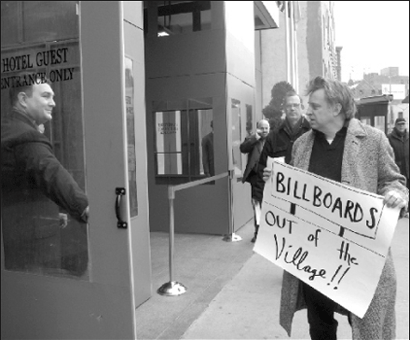By Julie Shapiro
Elizabeth Tiso has seen the Meatpacking District go through many changes, but even she was unprepared for the latest affront: an eight-story billboard.
“Billboards are not in the spirit of the West Village,” said Tiso, who has lived in the area for 20 years.
Tiso was among the 15 picketers last Thursday afternoon protesting the Hotel Gansevoort’s new billboard frame. The recently erected Hudson St. frame will hold billboards measuring 1,200 and 670 square feet, but the frame does not yet display advertisements.
Andrew Berman, executive director of the Greenwich Village Society for Historic Preservation, hoped to “keep pressure on the hotel and get the message to the guests,” he said. “This is the 800-pound gorilla of billboards in the neighborhood.”
The G.V.S.H.P. organized the picket, which attracted neighborhood residents and local business owners. The city is currently investigating whether the billboard is legal, and Berman anticipates a decision within the next week.
Holding signs that read “Billboards belong on highways,” “Stop trashing our community” and “Are you blind to your neighbors?” the participants marched in a circle in front of the hotel’s entrance. While hotel guests hurried past, the protesters chanted “2, 4, 6, 8 / This is not the interstate” and “Hey hey, Ho ho / The billboards have got to go.”
The picketers bundled against the chilly wind and distributed fliers with mitten-clad hands. The fliers encouraged people to call hotel management to complain about the “huge billboards that may belong on a freeway, but not in our neighborhood!”
Susan Perry, who lives around the corner from the hotel, attended the picket with her two dogs, a French bulldog and a puggle.
“I’m here on behalf of three generations of Villagers,” said Perry, who spent much of her childhood in the area. “I think [the billboards] are an obscenity…. They’ve succeeded in making the whole block look like a sewage-treatment center.”
Perry looked down at her dogs, who were tussling and pretending to bite each other.
“Even the dogs are angry,” she said.
Forty minutes into the picket, Sergeant John Wernicki arrived in response to a hotel manager’s call. Wernicki moved the picket away from the hotel’s main entrance, easing the passage of guests.
“You can protest all you want, but it has to be to the side of the door,” Wernicki told the demonstrators.
In the five years Wernicki has been on the Sixth Precinct beat, he has seen the Meatpacking District change.
“At night it gets a little hectic,” he said. “People want the character of the neighborhood maintained — I can understand that.”
Hotel manager William Hacking, who stood just outside the doors to shuttle guests around the protesters, was less sympathetic.
“This place was worth nothing” before it was developed, Hacking said, adding that businesses like the Hotel Gansevoort helped bring about the transformation.
Besides, he said, the hotel’s new billboard is hardly the first in the neighborhood.
“If you look up,” Hacking said, “how many billboards do you see?”
Too many, the protesters would answer. A half-naked man towers from an Abercrombie & Fitch ad, and billboards for Heineken beer and Level vodka beckon from the rooftops.
Michael Achenbaum, president of the Gansevoort Hotel Group, used the existing billboards to defend the hotel’s decision.
“Over the last few years, there have been numerous unpermitted signs within the neighborhood,” he wrote in a Feb. 9 letter to Berman. Achenbaum suggested that Berman focus his energy on those billboards instead.
Berman was unswayed.
“To say someone else is breaking the law is the worst possible way of looking a this,” he said. “Two wrongs don’t make a right, especially if one of the wrongs is eight stories high.”
Keith McNally, who owns the restaurant Pastis across the street from the Hotel Gansevoort, started a boycott in response to the billboard. Until the billboard is gone, McNally will not take the hotel’s reservations at Pastis or any of his five other restaurants.
Nearby eatery and bar 5 Ninth is also boycotting the hotel, and McNally has invited other business owners to follow his lead.
McNally hasn’t calculated how much money — if any — he has lost as a result of his boycott, but the money doesn’t bother him.
“I care more about the people who live in the neighborhood,” he said. “[The billboard] is awful.”
The ironic part, McNally said, is that the hotel benefits from the area’s unique character, but “They’re ruining it,” he said. “It will be just like everywhere else.”
Meatpacking District resident Anthony Tony is unimpressed by McNally’s decision.
“The owner of the restaurant is foolish — it looks very bad,” Tony said. Tony was disturbed by the protest, and complained that one of the participants blew a whistle in his ear. Tony hadn’t noticed the billboard and wasn’t concerned about it, he said.
Word of the billboard has spread to Web sites, like tripadvisor.com. A review by someone who signed in as “westfen,” entitled “Beware the New Billboard,” warns potential guests that “[the billboard] is giant, it is ugly, and you will think you are in Times Square.”
Another reviewer, “HIPVILLAGER,” wrote, “The neighborhood is enraged about the ARROGANCE OF THE GANSEVOORT HOTEL. If you’re hip, you won’t go there.” Other sites with negative reviews include Citysearch and HotelChatter.
Linda Lusskin has lived in the neighborhood at Jane and Hudson Sts. for 12 years.
“I’m watching the neighborhood change and I’m hating it,” she said as she passed out fliers.
Lusskin chose to live in the Meatpacking District because the old buildings and the sense of history made it so different from the rest of the city.
“Now it’s disappearing,” she said.
Lusskin attends G.V.S.H.P.’s events, and has been active in protests since the 1960s fight for women’s rights.
In her years as an activist, Lusskin has seen that “Money wins out,” she said.
“Money people think they can do whatever they want.” However, she said, “We’re not going to stop trying.”






































